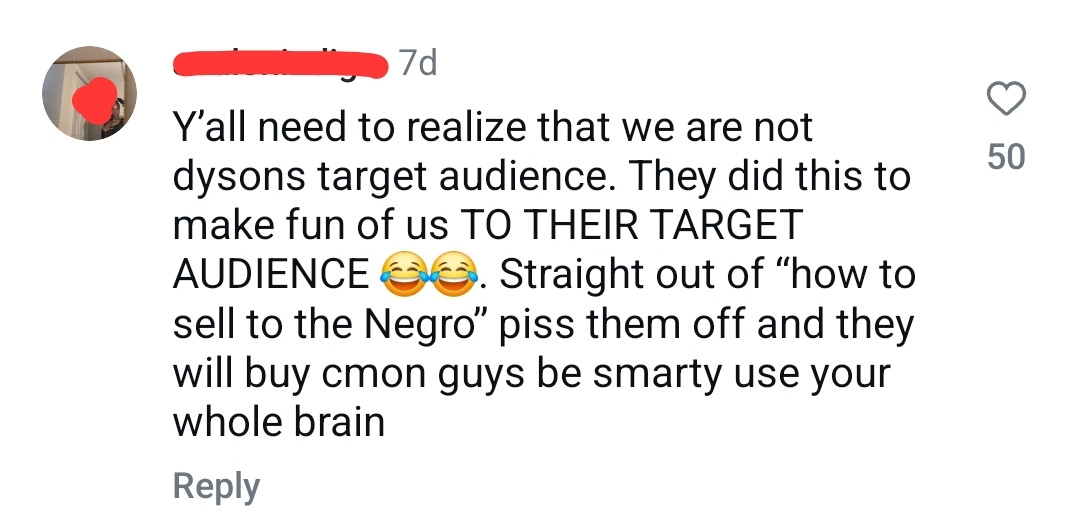In today’s post:
Q (not) A Beauty & Pop Culture Questions
The Full Beat The Beauty of Outrage: Why won’t brands get Black beauty right?
Did Sephora donate to Trump’s campaign? No. However, the confusion may be linked to the friendship between Trump and Bernard Arnault, owner of LVMH (Sephora’s parent company). Arnault presumably donated to the Trump campaign, but that hasn’t been proven yet. He’ll receive punishment enough for that friendship if Trump’s tariff’s hit at the proposed 20% mark.
Were people really camping outside Sephora? Girl yes. They opened their sixth store in the UK and rewarded the first 500 customers with special goody bags. Remember when I wrote “…some consumers would seek out objectively uncomfortable experiences to “enhance” the feeling of consuming everyday goods and services…”? I was right.
How will four years under Trump-Vance feel?
Dismal. Dystopic.
The Beauty of Outrage: Why won’t brands get Black beauty right?
Earlier this month Dyson posted and promptly deleted an ad showing a Black model with 4c hair using their Airstrait Straightener. The ad was supposed to show the tool’s ability to dry and straighten any wet hair type, quickly and without heat damage. They provide a brief example on their website using a model with straight hair. However, the ad fails in its attempt to show its efficacy on 4c hair. Many viewers question whether or not the dryer-iron was even on.
Dyson does not clearly,
tell us what to expect from the straightener,
show us that the model’s hair was wet, or
reveal a difference between the length of the model’s hair curly versus straight.
The ad assumes that viewers are aware of how the straightener works and what its limitations are. But of course, if that were true this wouldn’t have been their only straightener ad on a 4-anything hair types, from at least the last nine weeks. Instead, Dyson rolled out this ad as if they had recently done the work of educating consumers on what this expensive ($500) tool actually does. In the past nine weeks the only other ad featuring someone with a similar hair type was for their Chitosan™ Pre-style cream and Post-style serum, supplements to the Supersonic Nural™ hair dryer.
This ad succeeds where the most recent one fails because beauty influencer Kemmy tells us,
what to expect from the products,
how to use it, and
what her final, and successful, results are.
In a follow-up to the failed ad, beauty influencer Christina Abiola gives us and Dyson a tutorial on how to use the Airstrait on 4c hair. Christina opens the video by imploring Dyson to give her a call next time and walking us through its use. One of earliest comments highlights exactly the success of Christina’s ad, as a follower now understands what the tool is supposed to do.
Of course this bears the question, why didn’t Dyson give Christina a call initially? Or, some other popular Black beauty and hair influencer? In her video Christina shows that she’s used the Airstrait before, likely at an event, so why not share that on their Instagram account? Another comment on Christina’s video claims that this was an obvious attempt to generate outrage and attention from Black viewers.
Gabrielle Jones writes, “This phenomenon always serves to remind me of the Black community's lack of visibility in dominant white society as both consumers and people. It is a reminder to not privilege brands that make a spectacle out of inclusivity— rather to support brands who position it as a given that can be acknowledged.” The attention and engagement brands receive as a result of their public “failure” to meet the needs of Black consumers, may ultimately work in their favor.
If it is not “Black Outrage,” but a genuine gap in their inclusion efforts, why does that feel worse? To be clear, this conversation began with Dyson but it can be applied to other brands. We certainly can’t forget Youthforia’s black paint debacle. Nearly every week beauty influencer Golloria tests products to find out which brands are inclusive of deeper skin tones. And, nearly every week she is sent products that aren’t actually inclusive.
In the wake of the devestating results of the election, I am more frustrated by this kind of thing than I’d normally be. On one hand, these kinds of flops exemplify what happens when Black women’s interests and needs aren’t taken seriously, or considered. And, when we express our discontent the evidence of our frustration is erased without true consideration or rectification.1
I closed out the earliest editions of BlackBeautyPop with the reminder that nothing about Black women’s beauty culture is uncomplicated, including our relationships to brands that may not really see us.
I’m venting here obviously, but it’s just so frustrating you know? You know.🫂






https://youtu.be/rObAX1r8r0s?si=QtC6E4t68FUWbbL4